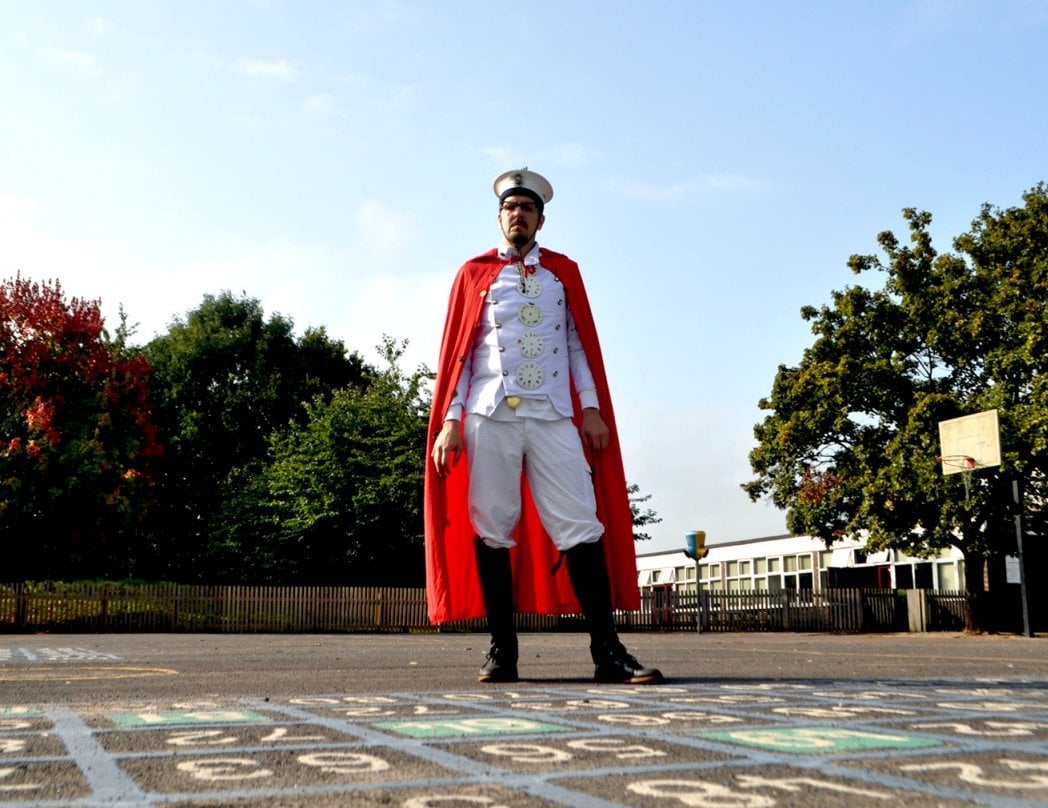
Steampunk Bob in the school playground
Photo: Bob Karper and Shula Hawes
Hunting for treasure
Time traveller Steampunk Bob has become (rather surprisingly) a primary school resource for teaching social, moral, cultural and spiritual values, writes Tina Corri.
You never quite know what’s going to happen with a People United artist commission, which is exactly why it can throw up some of the most interesting learning for us as an organisation. We explore the role the arts can play in creating a more kind and caring society and do it through large-scale neighbourhood projects, commissioning artists to make new work and undertaking research. We always start with the positive and through the arts seek to celebrate the best in human nature, and therefore the best in people.
Each year we have a national open call to artists to explore a universal theme such as courage, love, belonging, imagination or empathy. To do this we work with innovative partners ranging from the National Theatre and Turner Contemporary to Manchester Museum and the Southbank Centre. We look for the creation of new work where artists and partners can do something fresh or step outside of their comfort zone. The phrase we have come to use is one of ‘illuminating’ a theme or idea.
The research showed that pupils increased their kindness towards older people and dramatically enhanced their understanding of the arts
That’s how in 2014, thanks to investment from Artswork, we came to work with American-born performance artist Bob Karper, exploring role models in partnership with Lunsford Primary School in Kent. We were not looking for preconceived answers or specific artistic outcomes – we were hoping for work that would encompass risk, experimentation and collaboration. We selected Bob for this commission because of his proposal to explore the theme in a particularly considerate and enterprising way. He chose to sidestep the phrase ‘role models’ and instead focus on ‘treasure’, exploring the people that we treasure in our lives and why. Bob wanted to explore this idea not just with pupils, but with the wider school community, connecting children with residents at local care homes so that different generations could share stories about the people they value. Bob approached this commission by becoming ‘Steampunk Bob’, an eccentric time traveller who popped up at the school and hung out there. Although staff knew he would be taking up residence, the children had absolutely no idea. On their first day back, dressed in full steampunk paraphernalia with a propeller sticking up from the top of his head, Bob set himself up in the library making musical scores or strode around the playground measuring things. When asked what he was doing he simply said: “I'm busy”, “I’m an artist” or “You can help me if you like.” So the children came to experience Bob through curiosity.
Lunsford Primary is not a school with particular challenges, except perhaps the pressures of the national curriculum that can inhibit risk and creativity, and so the commission was intended as a disruption of its usual expectations. Bob worked with every pupil through poetry, music-making, performance and film. Throughout, pupils visited the care homes to talk, show artwork and sing. For a final celebration Bob invited everyone to an exhibition of the children’s work, a screening of his Treasure film and an evening of connection.
Finding out about the impact of our work is essential to our development. With our academic partner, the University of Kent, we now have almost eight years of academic evidence to show that our work with the arts has nurtured empathy, compassion and understanding between people. To try to measure the impact of Treasure, the University of Kent interviewed the children before and after the residency. The research showed that pupils increased their kindness towards older people and dramatically enhanced their understanding of the arts. It also showed that their role models changed, with more pupils looking towards their parents, rather than celebrities. Every child achieved Arts Award, the school an Artsmark Gold, and the intergenerational links continue.
A major part of our work concerns legacy. What happens after a commission ends and how can we disseminate findings? Inspired by the research results, we wanted to share what we had learned through a resource that would provide practical and relevant ideas. To help us, we consulted extensively with teachers. Initially, there was a clear appetite for something that could help primary teachers deliver the social, moral, spiritual, cultural (SMSC) curriculum creatively, but as time went on, the rising prominence of teaching and learning around ‘values’ in schools came into play. On reflection, we realised that while the artist commission in theory was about role models, in practice it had become about an awareness of the values that people have or personify, and of those values being put into action. And so Hunting for Treasure came into being: a free resource that has been created for teachers in consultation with teachers. It reflects our mission to create a more kind and caring society through the arts, and we hope it will support work around values in other schools, helping pupils to take risks, see a world outside the school gates, have their eyes opened to different artforms and reflect upon the best of humanity.
Tina Corri is Co-Director of People United.
peopleunited.org.uk
Join the Discussion
You must be logged in to post a comment.